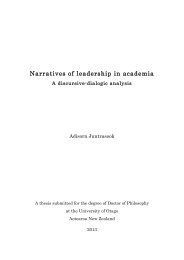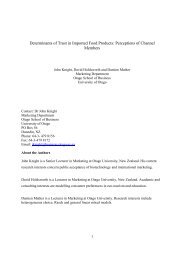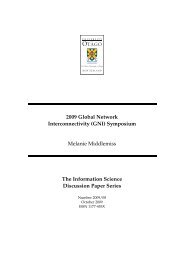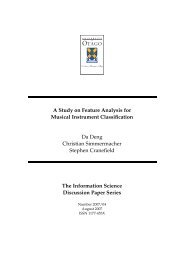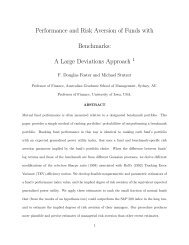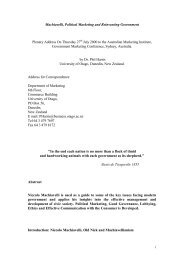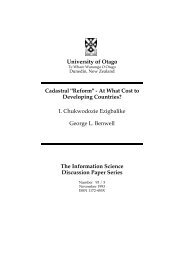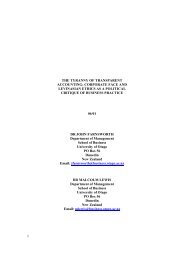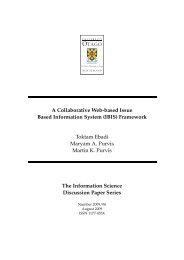Where is R2P grounded in international law? Anne-Marie Judson A ...
Where is R2P grounded in international law? Anne-Marie Judson A ...
Where is R2P grounded in international law? Anne-Marie Judson A ...
You also want an ePaper? Increase the reach of your titles
YUMPU automatically turns print PDFs into web optimized ePapers that Google loves.
obligations, that are not made <strong>in</strong> good faith are violations of <strong>in</strong>ternational <strong>law</strong>”. 358<br />
Article 29 (2) of the Universal Declaration of Human Rights outl<strong>in</strong>es these duties of<br />
the state to the fundamental freedoms of the citizen. “In the exerc<strong>is</strong>e of h<strong>is</strong> rights and<br />
freedoms, everyone shall be subject only to such limitations as are determ<strong>in</strong>ed by <strong>law</strong><br />
solely for the purpose of secur<strong>in</strong>g due recognition and respect for the rights and<br />
freedoms of others and of meet<strong>in</strong>g the just requirements of morality, public order and<br />
welfare <strong>in</strong> a domestic society.” These rights are considered customary as they were<br />
adopted by the General Assembly on 10 th December 1948.<br />
As previously outl<strong>in</strong>ed some rights <strong>in</strong> <strong>in</strong>ternational <strong>law</strong> are non-derogable violations<br />
<strong>in</strong>clud<strong>in</strong>g breaches of contract, of a treaty or a covenant. These breaches are<br />
violations of <strong>in</strong>ternational <strong>law</strong>, (Chapter 2) which constitute a departure from<br />
respected <strong>law</strong>s and customs of states and are therefore considered a violation of<br />
general <strong>in</strong>ternational norms and <strong>law</strong>s. The prohibition aga<strong>in</strong>st d<strong>is</strong>crim<strong>in</strong>ation with<strong>in</strong><br />
the International Covenant on Civil and Political rights <strong>is</strong> another example of a<br />
pr<strong>in</strong>ciple or <strong>law</strong> that <strong>is</strong> non-derogable, Chapter 4 (5.1.) Th<strong>is</strong> starts with the Charter of<br />
the United Nations (Introduction) and cont<strong>in</strong>ues through to the Convention on the<br />
Crime and Pun<strong>is</strong>hment of the Crime of Genocide, Chapter 3 (4.6), and <strong>in</strong>to the other<br />
<strong>in</strong>ternationally recognized treaties on apartheid, and economic and social rights,<br />
Chapter 3 (4.5). The <strong>in</strong>ternational community would not consider therefore<br />
derogat<strong>in</strong>g from these pr<strong>in</strong>ciples even under a state of emergency. So although they<br />
may be l<strong>is</strong>ted as derogable <strong>in</strong> a state of emergency a court may consider that these<br />
rights were <strong>in</strong>alienable and therefore the state would be <strong>in</strong> breach of the prov<strong>is</strong>ions it<br />
has violated. The Siracusa Pr<strong>in</strong>ciples outl<strong>in</strong>e a number of these rights associated with<br />
non-<strong>in</strong>ternational armed conflicts and the Geneva Conventions (1948), and the rules<br />
perta<strong>in</strong><strong>in</strong>g to Conventions of the International Labour Organization. 359<br />
Th<strong>is</strong> research <strong>in</strong> Chapter 3 suggested that it would be difficult to <strong>in</strong>tervene <strong>in</strong> a<br />
country on behalf of its citizens under <strong>R2P</strong> when the situation <strong>is</strong> strictly limited to the<br />
crime of genocide and/or war crimes. If the situation does not perta<strong>in</strong> to a non<strong>in</strong>ternational<br />
armed conflict or an <strong>in</strong>ternational armed conflict or genocide it cannot<br />
be considered an <strong>in</strong>tervention with<strong>in</strong> the def<strong>in</strong>ition of <strong>R2P</strong>. If the conflict <strong>is</strong> not tak<strong>in</strong>g<br />
358 Article 62 <br />
359 See article 68, 69 (a) – (i) <br />
<br />
108



